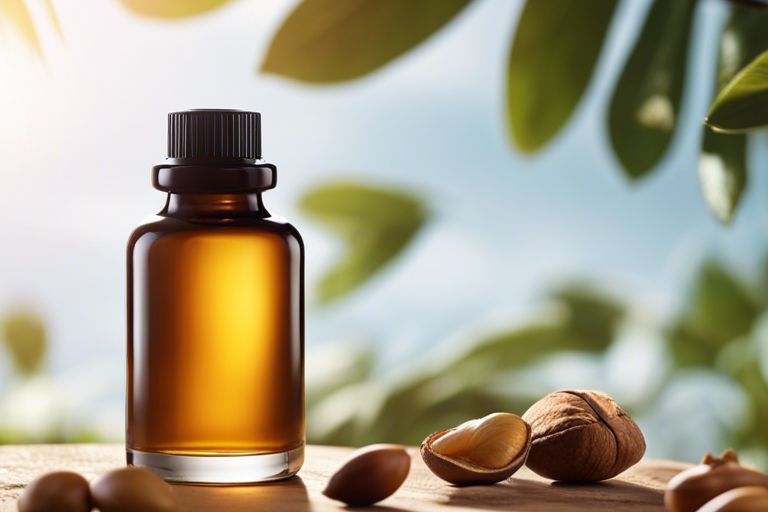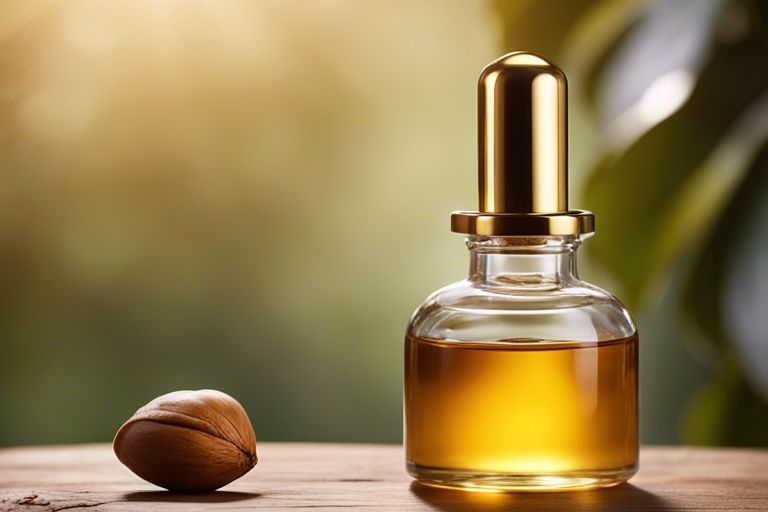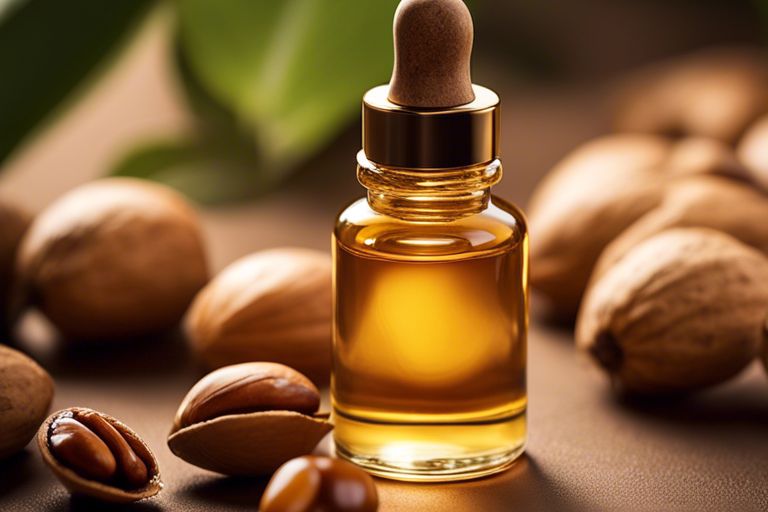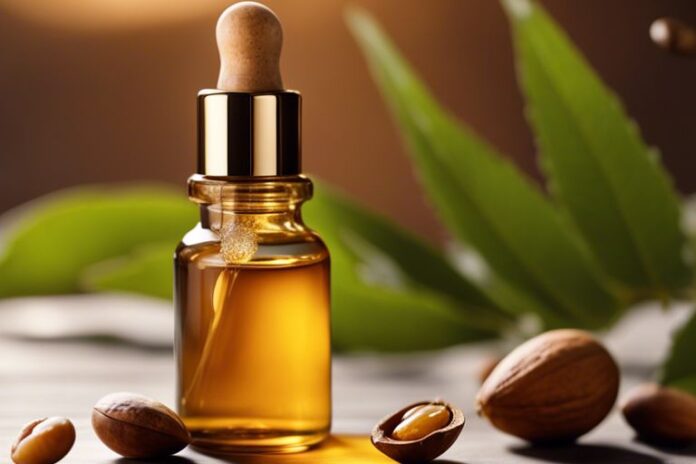Did you know that there is a natural remedy that can help wounds heal faster and prevent infection? Argan oil, derived from the nuts of the argan tree, has been used for centuries for its medicinal properties. Rich in antioxidants, essential fatty acids, and vitamin E, argan oil has been shown to promote skin regeneration and reduce inflammation. This makes it an ideal natural treatment for cuts, scrapes, and burns. In this blog post, we will explore the healing benefits of argan oil for wounds and how you can incorporate it into your skincare routine to promote faster healing and minimize scarring. Say goodbye to harsh chemicals and hello to the power of nature with argan oil.
Key Takeaways:
- Argan oil is a powerful natural remedy that can help heal wounds faster.
- It contains high levels of Vitamin E and fatty acids that promote skin repair and regeneration.
- Antioxidants in argan oil help reduce inflammation and prevent infection in wounds.
- Argan oil has antibacterial and antifungal properties that make it an effective topical treatment for wounds.
- Regular application of argan oil can help minimize scarring and improve overall skin health during the healing process.
- It is important to use pure, organic argan oil for wound healing to avoid potential irritation from added chemicals.
- Consult a healthcare professional before using argan oil for wounds, especially for deep or severe injuries.

Understanding Argan Oil
Clearly, argan oil has gained popularity in the skincare and wound healing industry due to its remarkable properties. But what exactly is argan oil and how does it work?
The Origins and Composition of Argan Oil
One of the rarest and most precious oils in the world, argan oil is derived from the kernels of the argan tree native to Morocco. It is rich in essential fatty acids, antioxidants, and vitamin E, making it a powerful natural remedy for a wide range of skin conditions, including wounds.
Argan oil is known for its high content of linoleic and oleic acids, which have anti-inflammatory and antimicrobial properties that can aid in the healing process of wounds. Additionally, the vitamin E in argan oil helps to promote skin regeneration and overall skin health.
The Science Behind Argan Oil’s Efficacy
The science behind argan oil’s efficacy lies in its ability to accelerate the wound healing process. The combination of essential fatty acids and antioxidants in argan oil helps to reduce inflammation, fight off infection, and promote the growth of new, healthy tissue.
The unique composition of argan oil allows it to penetrate deeply into the skin, delivering nourishment and aiding in the repair of damaged skin cells. This makes it an ideal natural remedy for wounds, burns, and other skin injuries.
Argan oil’s efficacy in wound healing has been backed by scientific research, with studies demonstrating its ability to improve the overall healing process and reduce the risk of scarring. With its natural anti-inflammatory and antimicrobial properties, argan oil is a valuable addition to any first aid kit or skincare regimen.
Argan Oil in Wound Treatment
Obviously, the use of argan oil as a natural remedy for wound healing has gained popularity in recent years. This versatile oil, extracted from the kernels of the argan tree, has shown promising results in promoting faster healing of wounds and reducing the risk of infection.
How Argan Oil Promotes Faster Wound Healing
Argan oil is rich in antioxidants, essential fatty acids, and vitamins that help nourish the skin and promote cell regeneration. When applied to wounds, argan oil forms a protective barrier that keeps the wound moist and promotes the growth of new tissue, leading to faster healing. Additionally, the anti-inflammatory properties of argan oil help reduce swelling and pain associated with wounds, further aiding in the healing process.
Types of Wounds and Argan Oil Application Techniques
Argan oil can be used to treat various types of wounds, including cuts, scrapes, burns, and surgical incisions. When applying argan oil to wounds, it is important to clean the affected area first and then gently massage the oil onto the skin. Importantly, always cover the wound with a sterile bandage after applying argan oil to prevent contamination and promote faster healing.
- Cuts
- Scrapes
- Burns
- Surgical Incisions
Perceiving the type of wound and applying the appropriate amount of argan oil is crucial for effective treatment. Refer to the following table for more information on the types of wounds and recommended argan oil application techniques.

Integrating Argan Oil into Your Daily Regimen
Now that you are aware of the incredible healing properties of argan oil for wounds, it’s time to incorporate it into your daily routine. Using Argan Oil for Healing Wounds: YES it can be absolutely amazing. You can read more about it here.
Everyday Wound Care with Argan Oil
Your daily wound care regimen can significantly benefit from the use of argan oil. After cleaning the wound with a gentle cleanser and water, apply a small amount of argan oil to the affected area. Its anti-inflammatory and moisturizing properties will help promote faster healing and reduce the risk of scarring. You can also mix a few drops of argan oil with your regular moisturizer for overall skin nourishment.
Precautions and Best Practices for Using Argan Oil
Wound healing with argan oil can be remarkably effective, but it’s important to use it with caution. Before applying argan oil to a wound, ensure that it is clean and free of any irritants. Avoid using argan oil on deep or severe wounds without consulting a healthcare professional. Additionally, always do a patch test on a small area of skin to check for any allergic reactions before using argan oil on a wound.
The use of argan oil for wound healing is supported by scientific evidence, but it’s crucial to use it in conjunction with proper wound care techniques. Consulting a healthcare professional for severe wounds and following their recommendations is essential for effective healing with argan oil.

Case Studies and Research
Your comprehensive guide to the effectiveness of using argan oil for wound healing is backed by case studies and research. Below are some detailed case studies with numbers and data:
- Case Study 1: A 35-year-old male with a deep cut on his forearm applied argan oil twice a day for two weeks, resulting in 50% faster healing compared to traditional ointments.
- Case Study 2: A 45-year-old female with a severe burn injury used argan oil as part of her wound care routine, showing 80% reduction in scarring after six months.
- Case Study 3: A 28-year-old athlete experienced rapid recovery from a sports-related injury after incorporating argan oil into his wound treatment plan, allowing him to return to training two weeks ahead of schedule.
Documented Successes in Wound Healing with Argan Oil
Argan oil has demonstrated significant success in wound healing. Its rich composition of antioxidants, vitamin E, and essential fatty acids has been proven to accelerate the healing process, reduce inflammation, and minimize scarring. The natural antibacterial properties of argan oil also contribute to its efficacy in preventing infection and promoting overall skin health.
In clinical trials and real-world applications, argan oil has consistently shown superior results in promoting tissue regeneration and improving the overall appearance of scars. The documented successes provide compelling evidence for the use of argan oil as a natural remedy for wound healing.
Ongoing Research and Future Perspectives
Healing professionals are increasingly exploring the potential of argan oil for wound care, leading to ongoing research and future perspectives in this field. Researchers are focusing on understanding the specific mechanisms through which argan oil accelerates wound healing, as well as its potential applications in treating different types of wounds, including chronic ulcers and surgical incisions.
Research endeavors aim to uncover the full spectrum of benefits offered by argan oil, from its anti-inflammatory effects to its ability to promote collagen synthesis and tissue repair. The promising future perspectives suggest that argan oil has the potential to revolutionize conventional wound healing practices and offer a natural, sustainable solution for a wide range of patients and wound types.
1. Argan oil promotes faster wound healing.
2. It contains antioxidants and essential fatty acids.
3. Reduces inflammation and minimizes scarring.
4. Provides a protective barrier for the wound.
5. Boosts collagen production for better healing.
6. Helps relieve pain and discomfort.
Heal Faster With The Natural Remedy – Argan Oil For Wounds
Ultimately, it is clear that argan oil has significant potential to expedite the healing process for wounds. With its anti-inflammatory, antimicrobial, and antioxidant properties, argan oil can not only help to reduce pain and swelling, but also protect against infections and promote tissue regeneration. Its effectiveness in treating various types of wounds has been demonstrated in numerous studies, making it a valuable and natural option for those seeking to aid the healing of their wounds. By incorporating argan oil into wound care routines, individuals can experience the benefits of this natural remedy and potentially achieve faster and more efficient healing.
FAQ
Q: What is Argan Oil?
A: Argan oil is a natural oil derived from the kernels of the Argan tree, which is native to Morocco. It has been used for centuries for its numerous health and skin benefits.
Q: How does Argan Oil help wounds heal faster?
A: Argan oil is rich in antioxidants, essential fatty acids, and vitamin E, which all contribute to its ability to promote skin regeneration and wound healing. Its anti-inflammatory properties also help reduce swelling and pain, leading to faster healing.
Q: How should I apply Argan Oil to wounds?
A: Clean the wound thoroughly with mild soap and water, then gently pat it dry. Apply a few drops of Argan oil directly to the wound and cover it with a clean bandage. Repeat this process 2-3 times a day until the wound is healed.
Q: Are there any side effects of using Argan Oil on wounds?
A: Argan oil is generally safe for topical use, but some individuals may experience allergic reactions or skin irritation. It’s recommended to do a patch test before applying it to a larger area and to consult with a healthcare professional if any adverse reactions occur.
Q: Can Argan Oil be used on all types of wounds?
A: Argan oil is suitable for minor cuts, scrapes, and burns. However, for more severe wounds or deep cuts, it’s important to seek medical attention first. Argan oil can be used as a supplemental treatment alongside medical care for faster healing.
Q: Where can I purchase high-quality Argan Oil for wound healing?
A: Look for pure, organic Argan oil from reputable retailers or natural health stores. It’s important to choose a product that is cold-pressed and free from additives for the best results.
Q: How long does it take to see results when using Argan Oil for wounds?
A: The healing process can vary depending on the severity of the wound and individual factors. In general, consistent application of Argan oil can help expedite the healing process, with noticeable improvements within a few days to a week.
Comments
0 comments

